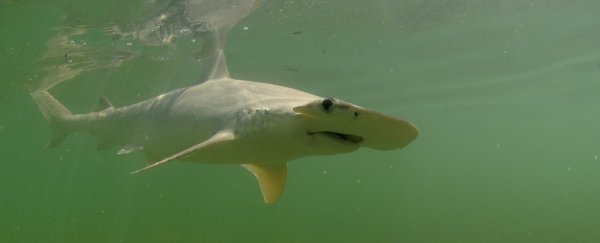Sharks are some of the most notorious meat-eaters on the planet. And for a long time, scientists assumed that the vast majority of these marine creatures were solely carnivorous.
The ocean, however, is full of surprises. Scientists have now discovered that one of the most common sharks in the world is actually an omnivore.
A new study reveals that the bonnethead shark (Sphyrna tiburo), a relatively small shark found in coastal waters around the US, is a flexitarian - meaning it has the ability to switch between a meat- and plant-based diet.
For a little over a decade, it's been know that bonnethead sharks, a type of hammerhead, consume a whole lot of seagrass, with more than 62 percent of their stomach contents housing the aquatic plant.
But scientists assumed that the sharks were doing this by mistake while combing through the shallows, hunting for crabs, squid, and other small invertebrates.
They didn't think that the sharks were actually capable of digesting the grass for sustenance.
"It has been assumed by most that this consumption was incidental and that it provided no nutritional value," lead author Samantha Leigh, an expert in ecology and evolutionary biology at the University of California, Irvine, told The Guardian.
"I wanted to see how much of this seagrass diet the sharks could digest, because what an animal consumes is not necessarily the same as what it digests and retains nutrients from."
To figure out whether these sharks were truly omnivorous, the scientists re-planted seagrass from Florida Bay in the lab. The plants were then given a unique and easily identifiable chemical signature by adding a specific carbon isotope to the water.
After collecting five bonnethead sharks, the researchers served the creatures a diet made up of 90 percent seagrass and 10 percent squid in the lab.
After three weeks, all of the sharks had put on weight. But that wasn't evidence enough, so the researchers ran a series of tests to see how much of the plant matter was digested and how much of it was excreted.
After a series of blood tests, the researchers found high levels of the chemical tracer in the shark's blood and liver tissue, suggesting that the seagrass' nutrients had indeed been absorbed.
The findings surprised even the authors.
"Finally, we determined which types of digestive enzymes (enzymes are used to break down food molecules) the bonnethead sharks possessed," Leigh told Gizmodo.
"Different enzymes break down different nutrients and generally, carnivores have very low levels of enzymes that break down fibres and carbohydrates. However, the bonnethead shark had very high levels of these types of enzymes!"
All in all, the research reveals that the five bonnethead sharks were digesting over half of the organic material found in the seagrass. The conclusion was clear.
"Bonnethead sharks are not only consuming copious amounts of seagrass but they are actually capable of digesting and assimilating seagrass nutrients, making them clear omnivores," the authors of the paper write.
"This is the first species of shark ever to be shown to have an omnivorous digestive strategy".
Not only do the findings undermine our assumptions about shark diets, they are also forcing scientists to reconsider the role that bonnethead sharks play in their local habitats.
If bonnethead sharks are at the top of the local food chain, seagrass meadows are the very foundation.
In fact, seagrass meadows are the most widespread coastal ecosystems on Earth, providing a home for thousands of fish and invertebrates, while at the same time filtering water and absorbing excess carbon dioxide from the atmosphere.
Now that we know these precious meadows have another predator, it could drastically alter the way scientists go about conserving them.
"We need to re-evaluate (the sharks') role in critical seagrass meadow habitats as omnivores as opposed to carnivores," Leigh told AFP.
The research has been published in Proceedings of the Royal Society B (link down at the time of writing).
